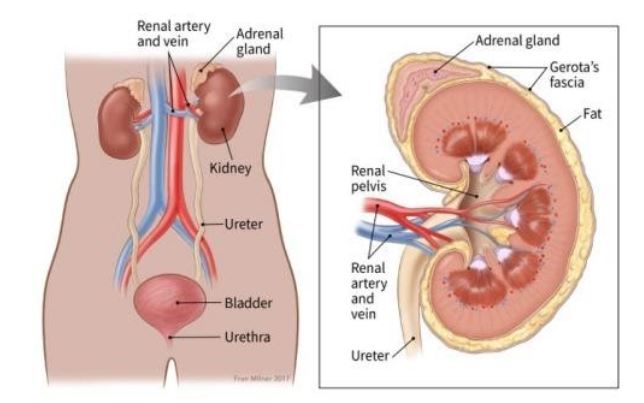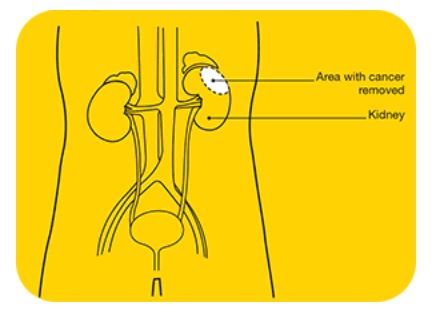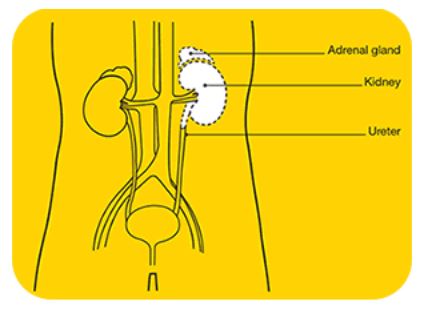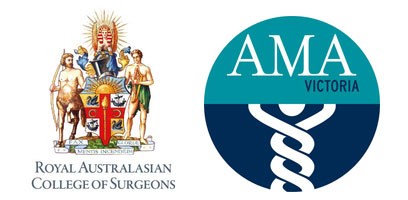KIDNEY CANCER
Surgery
Contact Us
If you would like to make an appointment please get a referral from your doctor first. We can then work with you to find the appropriate treatment plan.
Kidney Cancer Background
Kidney Cancer is also called Renal Cell Carcinoma. This is a primary cancer of the kidney and makes up 2-3% of adult solid organ tumours. It most often presents in the age group 50 – 75. They are most commonly diagnosed incidentally with scans for other issues, but can present with haematuria, flank pain and a mass or with unusual symptoms related to secretion of hormones or peptides from the tumour.

Active Surveillance
Active surveillance is a common approach for early kidney cancer under 3cm and will only be recommended if the doctor thinks it is the best thing to do. The treatment depends on several factors principally the stage of tumour, the age and health of the patient and the expertise of the surgeon
A SMALL RENAL MASS renal mass is defined for these purposes as a Kidney Tumour that is under 3 cm in size. Not all these tumours are cancerous and many may be suitable for surveillance rather than immediate surgery, especially in older patients, those with a single kidney, or people with other major health issues. It is extremely rare for tumours under 3cm to spread away from the kidney.
In younger patients, surgery is more likely to be recommended at an earlier time especially where there is a high degree of suspicion of cancer or if a biopsy confirms the diagnosis.
If observation is considered, I follow the European guidelines in terms of tumour growth – in general those that enlarge over time are considered more suspicious and treatment more likely. All such cases are discussed in a cancer meeting before being placed on surveillance. Patients will then undergo regular imaging and review in our clinic.
You might feel anxious about not treating a cancer in your body right away. However, active surveillance is a common approach for early kidney cancer in the right patient population and will only be recommended if the doctor thinks it is the best thing to do. If you are worried, discuss your concerns with your urologist, GP or a counsellor.
Surgery
Surgery is the main treatment for kidney cancer that has not spread outside the kidney. Depending on the type of kidney cancer, the size of the cancer, and your general health, you might have one of the following operations:
Removing part of the kidney (partial nephrectomy)
This is the preferred option for small tumours that are confined to the kidney. It may also be used for people with pre-existing kidney disease, cancer in both kidneys or only one working kidney. Only the cancer and a small part of the kidney are removed, which means more of the kidney’s function is preserved. A partial nephrectomy is a more difficult operation than a radical nephrectomy, and whether it is possible depends on the position of the tumour.

Image: Partial nephrectomy. A small part of the kidney is removed.
My preferred approach is ROBOTIC ASSISTED PARTIAL NEPHRECTOMY. This avoids the major incision needed for open partial nephrectomy with better access to the kidney than standard laparoscopic partial nephrectomy. The Robotic technique improves recovery, avoids painful scarring and has cancer outcomes equal to the open technique.
Removing the whole kidney (radical nephrectomy)
This is the most common operation for larger tumours. The whole affected kidney, a small part of the ureter and the surrounding fatty tissue are removed. The adrenal gland and nearby lymph nodes might also be removed. Sometimes the kidney cancer may have spread into the renal vein and even into the vena cava, the main large vein that runs up the body next to the spine. Even if the cancer is in the vena cava, it is sometimes possible to remove all the cancer in one operation.

Image: Radical nephrectomy. The kidney and a small part of the ureter are removed. The adrenal gland and nearby lymph nodes might also be removed.
If a whole kidney or part of a kidney is removed, the remaining kidney usually carries out the work of both kidneys. Your doctor will talk to you about any steps you need to take to protect the remaining kidney.
Other Treatments
Surgery is the most accepted treatment for early kidney cancer. However, if you are not well enough for surgery and the tumour is small, your doctor may recommend another type of treatment to destroy or control the cancer.
Radiofrequency ablation (RFA)
Radiofrequency ablation uses high-energy radio waves to heat the tumour. The heat kills the cancer cells and forms internal scar tissue. For this procedure, the doctor inserts a fine needle into the tumour through the skin, using a CT scan as a guide. An electrical current is passed into the tumour from the needle. The treatment takes about 15 minutes and you can usually go home after a few hours. Side effects, including pain or fever, can be managed with medicines.

